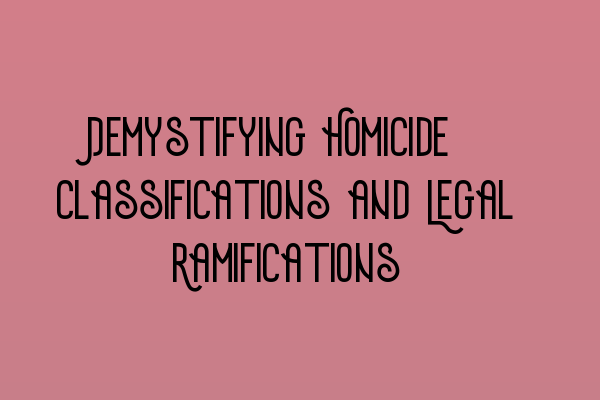Demystifying Homicide: Classifications and Legal Ramifications
Welcome to SQE Criminal Law & Practice UK, where we provide comprehensive legal information and resources to aspiring solicitors and legal professionals. In today’s blog post, we will be delving into the complex world of homicide, shedding light on its classifications and the legal ramifications associated with each.
The Basics of Homicide
Homicide refers to the unlawful killing of another person. It is a serious crime and is categorized into different types based on the circumstances surrounding the act. Understanding these classifications is vital for legal professionals, as it determines the charges and penalties that the accused may face.
Murder
Murder is perhaps the most well-known form of homicide. It involves the intentional and premeditated killing of another person. In legal terms, premeditation refers to the presence of intent and the planning of the act. Murder charges carry severe consequences, including lengthy prison sentences or even life imprisonment.
For more in-depth information on murder charges and the legal elements involved, you may refer to our article on SQE 1 Practice Exam Questions.
Manslaughter
Manslaughter, on the other hand, is categorized as the unintentional killing of another person. This classification is further divided into two subcategories: voluntary and involuntary manslaughter.
Voluntary manslaughter is often referred to as “heat of passion” or “crime of passion” manslaughter. It involves a situation where the accused acts in the heat of the moment due to a sudden provocation, which causes them to lose control and commit the act of killing. Depending on the circumstances, the penalties for voluntary manslaughter may be less severe than those for murder.
Involuntary manslaughter, on the other hand, covers situations where the accused did not have the intention to cause harm or kill but their negligent or reckless behavior resulted in the death of another person. Involuntary manslaughter charges can carry varying penalties, depending on the degree of negligence involved.
If you are interested in learning more about the intricacies of manslaughter charges, you may find our article on SQE 1 Practice Mocks FLK1 FLK2 helpful.
Infanticide
Infanticide is a distinct classification of homicide that involves the killing of a child under the age of one by their mother. It is important to note that for an act to be considered infanticide, the mother must have been suffering from a mental disorder or have been adversely affected by the act of giving birth. Infanticide carries its own legal implications and may result in reduced penalties compared to other forms of homicide.
If you wish to explore the topic of infanticide further, we recommend referring to our article on SQE 2 Preparation Courses.
The Legal Ramifications of Homicide
Homicide charges, regardless of their classification, carry serious legal ramifications. Conviction for homicide can result in significant prison sentences, the loss of personal liberties, and irreversible damage to one’s reputation.
As solicitors and legal professionals, it is our duty to navigate the complex web of laws and regulations surrounding homicide cases. Our expertise and knowledge can make a difference in protecting the rights of both the accused and the victims.
To stay up-to-date with the latest information regarding homicide charges and legal precedents, we recommend enrolling in our SQE 1 Preparation Courses. Our comprehensive courses will equip you with the necessary knowledge and skills to handle such cases with confidence.
Conclusion
Demystifying homicide classifications and understanding the legal ramifications associated with each is crucial for aspiring solicitors and legal professionals. By familiarizing yourself with the intricacies of this complex area of law, you can better serve your clients and ensure justice is served.
If you are interested in staying informed about upcoming SRA SQE exam dates and other relevant legal topics, we invite you to visit our website and explore our range of resources.
Thank you for joining us on this journey of demystifying homicide. Stay tuned for more informative articles and updates from SQE Criminal Law & Practice UK!
